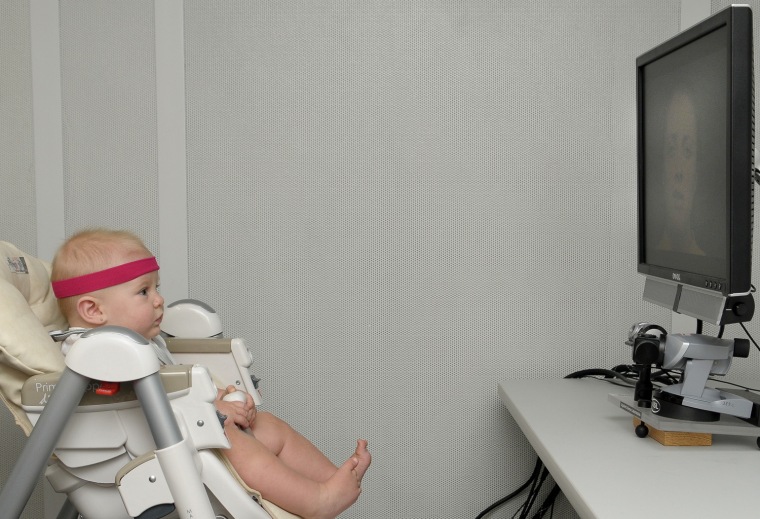By Joan Raymond
For years, the conventional wisdom was that babies learned how to talk by listening to their parents. But a new study in the Proceedings of the National Academy of Sciences shows that our little angels are using more than their ears to acquire language. They’re using their eyes, too, and are actually pretty good lip readers.
The finding could lead to earlier diagnosis and intervention for autism spectrum disorders, estimated, on average, to affect 1 in 110 children in the United States alone.
In the study, researchers from Florida Atlantic University tested groups of infants, ranging from four to 12 months of age and a group of adults for comparison.
The babies watched videos of women speaking either in English, the native language used in the home, or in Spanish, a language foreign to them. Using an eye tracker device to study eye movements, the researchers looked at developmental changes in attention to the eyes and mouth.
Results showed that at four months of age, babies focused almost solely on the women’s eyes. But by six to eight months of age, when the infants entered the so-called “babbling” stage of language acquisition and reached a milestone of cognitive development in which they can direct their attention to things they find interesting, their focus shifted to the women’s mouths. They continue to “lip read” until about 10 months of age, a point when they finally begin mastering the basic features of their native language. At this point, infants also begin to shift their attention back to the eyes.
The researchers believe this second shift in attention is due to the emergence of speech, and their burgeoning ability to better understand “social cues shared meanings, beliefs, and desires,” explains lead author David J. Lewkowicz, a professor of psychology.
In a second part of the study, the researchers looked at the role of early experience with a specific language and how it relates to lip reading in infancy.
Videos of a Spanish speaking woman were shown to English-learning babies between 4 and 12 months of age. The researchers found these infants also shifted their attention to the mouth by 8 months of age, but they continued to lip read as late as 12 months of age, unlike the babies who were exposed to the English video.
“These babies were experts at English, and now when they heard Spanish, it was like ‘Ok, this is weird, I better start looking at the mouth again, instead of the eyes, so I can figure out what’s going on.'”
The study data suggest that infants who continue to focus most of their attention on the mouth past 12 months of age, “... are probably not developing age-appropriate perceptual and cognitive skills and may be at risk for disorders like autism,” Lewkowicz says.
Although more research is needed, the finding may be able to provide about six months of earlier intervention for autism, which currently can be diagnosed with behavioral testing beginning at about 18 months of age. “The earlier we can diagnose it (autism), the more effectively we can ensure the best possible developmental outcomes,” says Lewkowicz.
